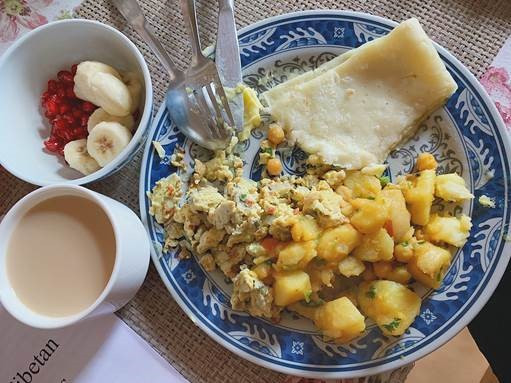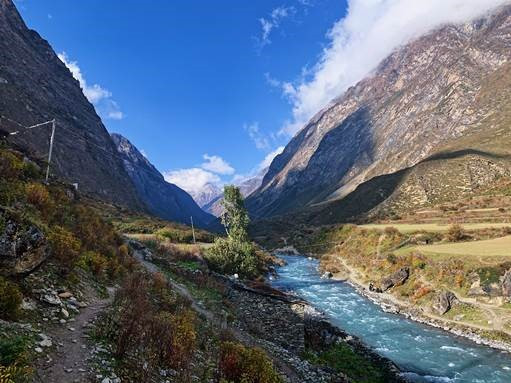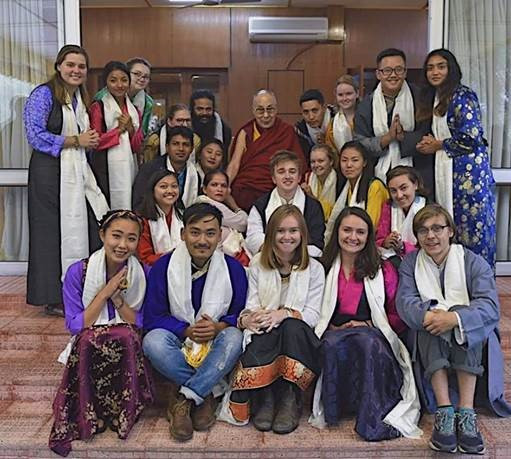“…my Gilman experience is far from complete.”
Hello! My name is Quincy Yangh and I am a 2020-2021 Gilman Alumni Ambassador from the Twin Cities, Minnesota, and a Geography and Political Science student at Gustavus Adolphus College. Additionally, I am a Doris Duke Conservation Research Fellow at the University of Washington-Seattle and a Midwest Organizing Fellow for Power Shift Network, a national climate justice organization. I was awarded a Gilman Scholarship in the fall of 2019, where I studied abroad in Kathmandu, Nepal, and interned at iProbono, an international humanitarian NGO in Delhi, India.

With the final chapter of my undergraduate journey coming to an end, my life has become quite hectic and tense as I try to balance my academic, professional, and social life. Last week in the midst of my busy schedule, a good friend of mine introduced me to Sudikshya Karki, a first-year international student from the country of Nepal. In typical Nepali manner, she invited me to have tea with her after our introduction. I stopped what I was doing and joined her for tea. For the next several hours we talked about the vibrant city of Kathmandu, our favorite street foods (we both agreed that panipori and laphing are the best), Nepal’s natural beauty, the people, the tea culture, and so much more. We spent a great deal of time talking about the tourist industry in Nepal and how foreigners often come to Nepal for its natural wonder, the Himalayas, and not for the rich diversity of cultures, religions, and languages practiced. Nepal is also home to Mount Everest, the highest mountain and point on earth, it only makes sense why people are drawn to the country. Yet, when people are so focused on the Himalayas, especially Mount Everest, they forget about the stewards and occupants of the land. This is a stereotype that Sudikshya has actively dismantled since her arrival to the United States, and one I’ve been actively aiming to dismantle in my daily conversations as well. To honor a place includes honoring its people. Nonetheless, my encounter with Sudikshya, who is now a friend, reminded me that life is about the little moments that arrive out of the blue. She carries a piece of Nepal and reminds me that I carry a piece of it as well. Together we play a role in composing the image of Nepal to our own communities, one that looks beyond tourism and romanticism.
Snippets of my Gilman experience are still seen in several aspects of my life today, my senior capstone research project is a testament to that. When I was abroad as a Gilman scholar, I had the opportunity to be a guest of Tsum Valley, a Himalayan valley that is over 12,000 feet above sea level. During my time there, I ascertained the relationship between storytelling, climate change, and Traditional Ecological Knowledge (or Indigenous Knowledge) in the valley. Over a year later, I’m working on a research project that builds upon the initial research I conducted as a Gilman Scholar. My capstone research project aims to illuminate the unique Traditional Ecological Knowledge of Tsum Valley by assessing its relationship with the global academic literature on Indigenous Geographies. This will be done by rekindling the relationships I made while abroad. I look forward to engaging with my friends from Tsum Valley again.
As the Teaching Assistant (TA) for the courses World Geography and Climate Change I draw upon my Gilman journey to expand the class learning environment by offering a field-based experience to present-day issues such as climate change, geopolitics, and human rights abroad.

I share these experiences to show that one’s (in this case mine) Gilman journey never really ends. It builds upon itself in subtle ways. One of the greatest gifts that the Gilman program provided me was a new interdisciplinary lens through which I now use to influence actions. The spirit of the Gilman program is to strengthen and harness the power of diplomacy. An imperative part of this is through community and civic engagement. Through numerous collaborative projects with others abroad, whether that be research or volunteering, fueled my commitment to bridge communities across different cultural backgrounds. My Gilman experience ignited my will to inspire other students to pursue their study or intern abroad aspirations. As a Gilman Alumni Ambassador and an active member of my institution’s Global Engagement Committee, I am passionate about connecting historically underrepresented students with study abroad resources and mentors. To say the Gilman Scholarship Program is more than a scholarship would be an understatement. My Gilman experience allowed me to build upon my capacities as a leader, public servant, and budding academic. Furthermore, it introduced me to a network of like-minded individuals who are trailblazers within their professional careers. I can affirm to you all that my Gilman experience is far from complete.
p.s. For those who read my last article, I shared with you that I applied for a Fulbright ETA grant to Taiwan. I’m thrilled to share with you all that I’m a semi-finalist!




